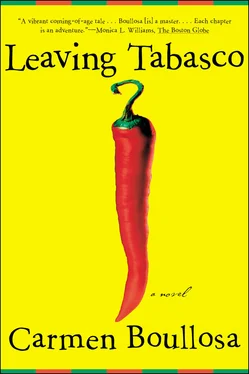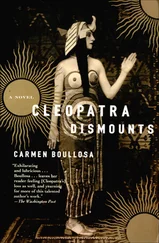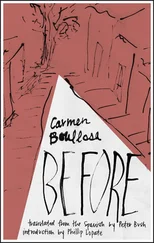The following Sunday there was an earth tremor. I’m not saying we’d never had tremors before; we had, but never on a Sunday. We usually had them when we kids were in school, with the nun screaming in panic, “The end of the world has arrived!” But it all ended merely in our laughing mockingly at her. But this time the earth trembled as we were finishing off preening ourselves to go to church for the nine o’clock mass, the Indians having left the church by then and gone off to market their seeds. As if it wasn’t upsetting enough for the earth to quake on a Sunday, the roof of the market also collapsed. And we all, children, women, adult males, spent the rest of the day rescuing the people who had been trapped under it.
Grandma didn’t want to let me go and help. “They’re just Indians there,” she said. But she made the mistake of saying it in front of the priest, who turned on her, telling her that what she had just said was totally indefensible. “But they’re a bunch of brainless idiots,” she dared to reply. At that, he told her that she’d better not dare to say that again in his presence or in the presence of God anywhere, that the Indians were not one bit less human than she was, and that either she could let me go help them of her own free will or she’d have to answer for it in the confessional. So I went off with the others and put myself at the disposal of the secondary school teacher who had organized squads of workers to raise the fallen pieces of cardboard and tangle of sticks that had trapped the Indians. Under the collapsed roof they were uttering loud, piteous complaints. One squad had the job of helping them as they emerged, another gave them food and drink, another had to patch up their wounds and calm them down and usher them to one side so that they didn’t impede the work of the rescuers. As he gave them his blessing, the priest took advantage of the occasion to ask each of them if he’d been baptized. Those who answered no, he seated on a bench he’d had brought from the church. When the bench was full, he had them bring another. When this other was full, he himself went for the third, ordering us not to let any Indian get away while he was away. Benches weren’t ordinarily used by the Indians at Masses; benches were pushed aside against the walls, allowing the crowds of Indians to mill around. So now, here in the open air, those who had just escaped the ruins of the market sat on them with exquisite propriety, as immobile as statues. Thus, when the priest went for the third and then a fourth and then a fifth bench, not one of the unbaptized Indians attempted to run off. However, some of the Indians who had claimed that they’d already received baptism pushed their way onto the already crowded benches. I’m not sure whether they wanted a comfortable seat or whether they were emotionally affected, like the rest of us, by the sight of their companions formed into a solemn group, a frieze of ceremonious expectation. The majority were old men or women, of two or three different ethnic groups. Some of the women were bare-chested, while others were shrouded to the tops of their heads in dark rebozos. Some wore skirts and blouses embroidered in bright colors, while their neighbors were clad totally in white.
The whole Sunday was spent rescuing these buyers and sellers of seeds. When night fell, we witnessed their collective baptism. The priest asked them to remain seated and went from one to another, addressing them in their own tongue, and singing Indian melodies that I never imagined he would know, pouring water over them from a painted gourd, as light as a dancer and absolutely blissful, while the rest of us, exhausted, watched him come and go without the least understanding of his sense of triumph.
The nuns prepared bowls of pozole soup for supper. I went home to listen to Grandma’s bedtime story.
“When we lived on the farm, the first day of each month, including January, even though it was a religious festival, we made a trip to visit an aunt who was sick both night and day. Her illness had left the skin of her body and her face marked with stripes. The spiteful people of the town called her ‘the zebra from the Caribbean.’ She lived quite near to our farmhouse, because she owned the adjacent farm to the south and had built her house at its northernmost limit in order to be close to us. But her decision had not paid off since we saw her only once a month. Getting to her place was a real expedition; it took us well over three hours of fast going to get there. The road that led from our farmhouse actually took us farther from hers, so we traveled instead along uneven tracks, and as we got closer to her house, even these disappeared. It was always the same man who guided us, using his machete to chop lianas and branches out of our way, slashing at them with the cold indifference of an animal treading on a daisy. The jungle was out to defy him, but not even an expert eye could have guessed the force he expended against it. Elegantly, like a butterfly floating on the breeze, he swung his machete, twisting his head so that his Panama hat danced on it, but his efforts left him bathed in sweat. His arms were deeply sunburnt, his muscles as hard as logs, the prominent veins looking as if they’d been carved there by a chisel. He’d leave our farm wearing a long-sleeved shirt, but midway on the journey, he’d roll up his sleeves, careless of the biting insects and the spiny thorns and the leaves that caused skin rashes, with no protection against the dengue fly or the terrible bite of the black widow, not worried that a scorpion might drop down on him from above and poison him with its deadly bite. When we reached our destination, he’d roll down his sleeves, put in his cuff links, and, despite being drenched in sweat, adopt the air of a gracious and imperturbable gentleman.
“On the way there he never once turned around to look at us or spoke a single word. My grandmother called him ‘the German’ and told us that as a boy he had gone around exposing pyramids in order to photograph them, but that after some contretemps, whose exact nature was never made clear, he’d decided he wanted no more of ‘those absurd piles of stones.’ Instead he lavished on the jungle a love that bordered on the fanatic, the kind of love, I imagined, he’d once lavished on the absurd piles of stones. With the same ease with which he swung the machete to left and right, mastering the most overgrown masses of growth, as if God had created him expressly for this purpose, he would sketch drawings of each one of the jungle plants on huge sheets of papers that he’d had sent especially from Europe. Then, he would color them in with a patient exactitude, writing down their names, and on a second sheet listing their qualities: smell, dimensions, type of blossom and fruit, etc. Then he’d move on to the next one, in what was a labor without end, with so many herbs, so many plants, so many trees, and so many flowers thronging our jungle.
“He was always impeccably dressed, as if on the point of leaving for a party. He had a room next to the house of my aunt’s nurse, and my grandmother said he was the only consolation she had in the world. How did the German console an aunt who was sick both night and day? Well, I never even dared put the question into words.
“One first of September, when we had to sleep over at my aunt’s place because a spectacular storm had broken, the German came into the kitchen in the evening and without saying a word got out an unbelievable number of eggs and beat them with a wild energy. He then put the same energy into frying up for us some inflated fritters, like hollow buns, which we ate with the milky juice you get from fig leaves. They were exquisite.
Читать дальше












